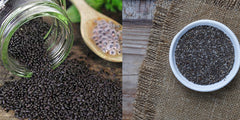Lemongrass Tea benefits, Side-effects and Facts
 Lemongrass is a kind of plant whose oil and leaves will also be used to develop medication. As an aromatherapy treatment for a variety of ailments, lemongrass is frequently taken orally, applied externally, or sniffed. However, there is little scientific evidence to back up much of its regular use.
Lemongrass is a kind of plant whose oil and leaves will also be used to develop medication. As an aromatherapy treatment for a variety of ailments, lemongrass is frequently taken orally, applied externally, or sniffed. However, there is little scientific evidence to back up much of its regular use.
Lemongrass is a flavor that is used in both food and drinks. For instance, herbal drinks sometimes contain lemongrass leaves, providing a "lemon" flavor. Lemongrass is used in the making of deodorants, soaps, and cosmetics as a scent. Numerous soaps, candles, cleaning agents, insect repellents, and disinfectants all include lemongrass essence to give them their refreshing aroma. Lemongrass is also utilized in the production of vitamin A and natural citral.
A prominent ingredient in Thai cooking is lemongrass, a tropical herb with Southeast Asian origins. Lemongrass is a popular natural treatment for high blood pressure, neurological difficulties, and stomach problems that is now cultivated throughout North and South America, Australia, and Africa. Lemongrass is also said to be antibacterial and antifungal. It has long been used to ease pain and lower fever. Citral, a naturally derived element having anti-inflammatory properties, is found in lemongrass. The ideal method to consume lemongrass has always been in tea, whether it is brewed from dried lemongrass stems or freshly picked lemongrass. Fresh lemongrass stems may be found at Asian grocery stores. Let’s learn more about lemongrass tea's benefits and side effects.
Nutrition Information
Lemongrass Tea contains:
Iron, calcium, and vitamin C are some of the ingredients that are found in lemongrass. Hemoglobin, which is crucial for carrying oxygen from your lungs into the blood, contains iron as a necessary element.
Lemongrass's potential health advantages
According to medical news today, lemongrass may provide several health advantages. Flavonoids and phenolic compounds, which include antioxidants, are abundant in lemongrass. It has anti-inflammatory and antioxidant qualities and is also good against bacteria and fungi. Quercetin, a flavonoid with anti-inflammatory and antioxidant properties, is a component of lemongrass. By reducing inflammation, quercetin slows the formation of cancerous cells and guards against heart disease.
In Africa, lemongrass is said to cure coronary heart disease. In one study, mice were given a seven-day lemongrass extract therapy; as a consequence, their high cholesterol levels considerably decreased.
When used directly, lemongrass essential oil reportedly demonstrates antifungal and anti-inflammatory properties. Lemongrass oil was tried externally on mice with inflammatory skin disorders and fungal infections. Even though it has shown great potential as a successful therapy for skin problems, additional analysis is necessary.
Consuming spoiled food can result in food sickness from E. coli bacterial infections. It may also result in pneumonia and urinary tract infections. Through one analysis, researchers discovered that lemongrass essence efficiently lowers the toxicity of E. coli cultures and will cure bacterial infections inside the gastrointestinal system.
Aromatherapy uses lemongrass essential oil to sweeten the atmosphere, ease tension, and improve the mood. Similarly, lemongrass is used as a conventional treatment to improve immunity, ease discomfort, and encourage sleep. A really common way to consume lemongrass is in tea. Scroll down to find out how drinking lemongrass tea could contribute to several possible health advantages.
Lemongrass Tea health benefits
1.It has antioxidant qualities.
Research on the Healthline website found that lemongrass comprises a range of antioxidants that could improve your health and combat disease-causing free radicals. Chlorogenic acid, isoorientin, and swertiajaponin are noteworthy antioxidants. These antioxidants might help in avoiding coronary artery cell dysfunction.
2.It possesses microbial resistance qualities.
Lemongrass tea's antimicrobial qualities could effectively cure cavities and oral infections. According to an in vitro study conducted in 2012 and published first by the National Institutes of Health Article, lemongrass essential oil has antimicrobial properties against the Streptococcus mutans bacterium, which is largely responsible for dental decay.
Additional studies
According to a reliable source, silver ions and lemongrass oil have been shown to be effective in vitro against a variety of bacteria and fungi.
3 It has inflammatory-reducing qualities.
Heart disease and stroke are two illnesses where inflammation is considered to have an influence. Citral and geranial, two of the primary constituents of
lemongrass, are primarily accountable because of their anti-inflammatory properties, as per the Memorial Sloan Kettering Cancer Center.
Such ingredients are believed to play a role in preventing the production of several inflammatory indicators inside the body.
4.It could lower your chance of developing cancer.
Lemongrass's citral has been believed to possess powerful anticancer properties for certain cancer cell types. Lemongrass has a range of compounds that treat cancer. It happens whether by explicitly killing cancer cells or by strengthening the immune system, because the body can then fight cancer more effectively on its own.
When undergoing chemotherapy or radiation, lemongrass tea is occasionally seen as an adjuvant treatment. An oncologist's advice should always be sought before using it.
5.It could support good and healthy digestion.
A glass of lemongrass tea is the simplest and most effective treatment for upset stomach, stomach cramps, and other digestive issues. According to a reliable article citing a 2012 mouse study that was released by the National Institutes of Health, lemongrass could also be useful for stomach ulcers.
According to the research, the essential oil produced by lemongrass leaves could safeguard your stomach lining from harm caused by aspirin and ethanol. Gastric ulcers are frequently brought on by frequent aspirin usage.
6. It could have diuretic effects.
Lemongrass has been a well known diuretic in the field of natural health. A diuretic causes you to flush quite frequently, helping your body get rid of extra salt and water. Whether you have edoema, liver failure, or heart failure, diuretics are frequently recommended.
In a 2001 study testing lemongrass tea's impact on mice, diuretic effectiveness comparable to that of green tea was seen without organ failure or any negative impacts. Mice were exposed to lemongrass tea for six weeks as a phase of the analysis.
7. It might assist in lowering excessive systolic blood pressure.
During independent research conducted in 2012, 72 male participants received either green tea or lemongrass tea for consumption. The systolic blood pressure of everyone who consumed this lemongrass tea moderately decreased, whereas diastolic blood pressure slightly rose. Additionally, their heart rates were much lower.
Researchers warn that whereas all those results are encouraging for people who have high systolic blood pressure, individuals with cardiac issues may take lemongrass wisely. In doing so, one could prevent potentially harmful decreases in overall heart rate and rises in diastolic pressure.
8. It might assist in controlling cholesterol.
Your chance of having a heart attack or stroke might rise if you have high cholesterol. According to research in the Journal of Advanced Pharmaceutical Technology & Research, lemongrass oil extract reduced cholesterol levels in mice. The dosage affected how much cholesterol was reduced.
2011 saw more studies on rats concluding that taking approximately 100mg of lemongrass essential oil every day was harmless with time. Further study is required to determine whether lemongrass tea provides relatively similar benefits to lemongrass oil.
9. You might be able to lose weight.
You may cleanse with lemongrass tea, which can boost your metabolism and aid in weight loss. Despite this, the majority of the studies on lemongrass and weight loss are subjective but not empirical. Lemongrass is a natural diuretic, so whenever you consume any at all, you could lose some weight.
In layman's terms, switching to herbal teas such as lemongrass from sugary beverages or any food beverages in your routine could lose weight. Lemongrass tea must not be your only beverage, though. It could also make negative outcomes more likely. Consider drinking water or any neutral beverage in between glasses of lemongrass tea.
10. It might ease PMS symptoms.
Bloating, hot flashes, and menstrual cramps are all treated naturally with lemongrass tea. Although there is not much particular study on lemongrass and PMS, having calming effects on the stomach but rather anti-inflammatory characteristics might be helpful. According to a paper published in Advanced Pharmaceutical Technology & Research Reference, lemongrass oil can help your body relax.
Potential Risks of Lemongrass
Lemongrass has powerful compounds, so you might carefully seek medical advice before purchasing it or any other ingredient. Before actually taking lemongrass or lemongrass tea, think about these risks:
While used externally, lemongrass oil might result in irritation. Lemongrass should not be consumed if someone reacts badly to the oil when using it externally.
According to certain reports, lemongrass must be avoided by expectant mothers. Although there isn't much proof that lemongrass can induce menstruation, there's a certain worry that it can result in a miscarriage. Further study is required to determine if lemongrass may be taken safely while pregnant.
Potential negative impacts and dangers
Overall, lemongrass is regarded as safe for use in substantial quantities, which includes the quantity commonly used to prepare tea.
Possible negative consequences include:
- The dizziness
- It makes you more hungry
- fatigue,
- excessive urination,
- and dry mouth
Lemongrass could cause allergies in certain people. Seek immediate medical advice if you develop signs of an allergic reaction, such as:
- fast heartbeat
- had trouble breathing.
- Itching
- and rashes
If any of the following applies to you, you must not drink lemongrass tea
- use prescription diuretics
- when you’re pregnant
- They possess a slow heartbeat
- Having low amounts of potassium
The conclusion
In summary, lemongrass tea is a reliable and beneficial herbal beverage. Several organic grocery stores offer it, and it's simple to cultivate. In both animal and laboratory studies, lemongrass has been demonstrated to have anti-inflammatory, antimicrobial, and anticancer effects. Additionally, lemongrass can enhance the lipid profile and preserve the lining of your stomach.
Various lemongrass research has been conducted utilising lemongrass essential oil rather than lemongrass tea. Further clinical research involving lemongrass tea is required to verify its beneficial properties of lemongrass.
Unless you have your physician's permission, you may not personally treat any disease utilizing lemongrass tea or substitute this for any recommended drug.








Leave a comment